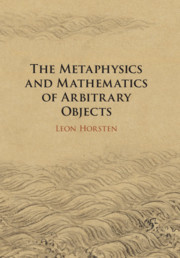Description
The Metaphysics and Mathematics of Arbitrary Objects
Author: Horsten Leon
Develops and defends a new metaphysical and logical theory of arbitrary objects that will reinvigorate the philosophy of mathematics.
Language: English
Subject for The Metaphysics and Mathematics of Arbitrary Objects:
Approximative price 32.87 €
In Print (Delivery period: 14 days).
Add to cart
The Metaphysics and Mathematics of Arbitrary Objects
Publication date: 10-2021
Support: Print on demand
Publication date: 10-2021
Support: Print on demand
Approximative price 107.80 €
In Print (Delivery period: 14 days).
Add to cart
The Metaphysics and Mathematics of Arbitrary Objects
Publication date: 06-2019
246 p. · 17.8x25.4 cm · Hardback
Publication date: 06-2019
246 p. · 17.8x25.4 cm · Hardback
Description
/li>Contents
/li>Biography
/li>
Building on the seminal work of Kit Fine in the 1980s, Leon Horsten here develops a new theory of arbitrary entities. He connects this theory to issues and debates in metaphysics, logic, and contemporary philosophy of mathematics, investigating the relation between specific and arbitrary objects and between specific and arbitrary systems of objects. His book shows how this innovative theory is highly applicable to problems in the philosophy of arithmetic, and explores in particular how arbitrary objects can engage with the nineteenth-century concept of variable mathematical quantities, how they are relevant for debates around mathematical structuralism, and how they can help our understanding of the concept of random variables in statistics. This fully worked through theory will open up new avenues within philosophy of mathematics, bringing in the work of other philosophers such as Saul Kripke, and providing new insights into the development of the foundations of mathematics from the eighteenth century to the present day.
1. Introduction; 2. Metaphysics of mathematics; 3. Arbitrary objects; 4. Mathematical objects as arbitrary objects; 5. Structure in mathematics; 6. Mathematical structures; 7. Kit fine; 8. Generic systems and mathematical structuralism; 9. Reasoning about generic w-sequences; 10. Probability and random variables; 11. Directions for future research.
Leon Horsten is Professor of Philosophy at the University of Bristol. His publications include The Tarskian Turn: Deflationism and Axiomatic Truth (2011) and Gödel's Disjunction: The Scope and Limits of Mathematical Knowledge (co-edited with Philip Welch, 2016).
© 2024 LAVOISIER S.A.S.

